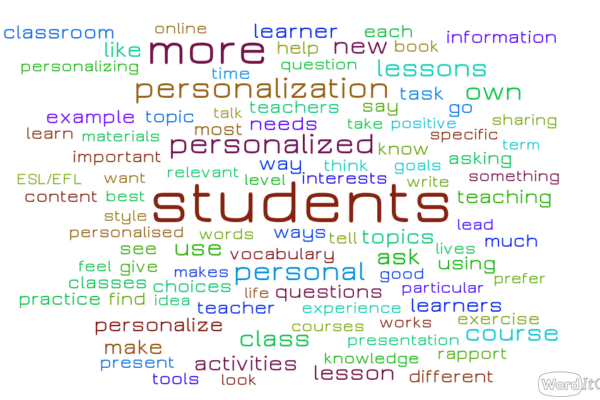Engaging learners (Part 1)
When I was an English student, some teachers had the magical ability to deliver lessons that were fun and engaging, which allowed me to express myself and to feel I had an active role in my own learning.
As I tried to learn how to teach, the ready-made activities that I came across (and the one-size-fits-all solutions they usually propose), frequently failed to replicate, in my students, that feeling I’d had as a learner. So did the ‘fireworks’ – songs and films I naively used as if they were able to, on their own, perform the magic of keeping students interested in the lesson.
Experience and having the chance to observe other teachers in action, however, provided me with useful insights on how to make learning more meaningful and, therefore, more engaging. I’d like to share three of those with you today.
Personalising language
It’s one thing to fill in the blanks. Filling in blanks with your ideas, thoughts, emotions and opinions, however, is a whole different story. Even though exercises that deal exclusively with form may have their space in the EFL classroom, I tend to agree with Rinvolucri (1999:195) when he states that the social aspect of language is missing in such activities.
Course books are often rich in controlled practice of language items like the one below:
Choose the best answer from the options:
If I have/had a car, I would drive/drove to work every day.
Something as simple as asking students to react to the content of the statements by, for example, adapting sentences so they are true for them before ‘moving on’ to the following activity, can go a long way in promoting frequent moments of genuine one-to-one interaction.
Favouring learning over teaching
As teacher, we take pride in being able to provide effective explanations of complex language structures and clarifying meaning. However, spoon-feeding learners to the point that they do not have to think for themselves may lead to dependency and frustration.
On the other hand, allowing learners to do ‘the hard work’ (make sense of the language, infer meaning form context, explain the use of structures to peers etc.) might help promote long-term retention and increase chances of memorisation. Because learners are cognitively engaged in the process, making their own associations and coming up with their own definitions, they are more likely to remember that in the future.
Telling students why they are doing what they are doing
As teachers, we’ve studied methodology and theories of second language acquisition and can justify our choices when preparing a lesson. But do students know that?
Decades have elapsed since theorist such as Lewis & Hill (1992:11) advocated in favour of raising learners’ awareness of the learning process. Still, learners around the world are frequently led through cycles of pre-listening tasks, listening for gist, listening for detail and post-listening discussions without being made aware of how that might help them become better users of the language.
Some of the most successful lessons I observed involved teachers raising awareness of sub-skills and strategies by asking very simple questions such as “In what real-life situations would you listen to something and have to make notes at the same time?” or “If you are reading a manual because you want to check how to change the ringtone of your mobile, do you read the entire manual?”
Of course, there are countless ways in which we can try to increase our learners’ engagement. I myself keep on trying to allow learners to marvel at the experience of studying the English language the way I did as a teenager. In my post next month, I’ll share some more insights and reflections on this topic, but I would love to hear your thoughts. How do you keep your learners engaged?
References:
Lewis, M. & Hill, T. (1992) Practical techniques for English teaching. Language Teaching Publications.
Rinvolucri, M. (1999) The humanistic exercise. In Arnold, J. (ed.) Affect in language learning. CUP.






